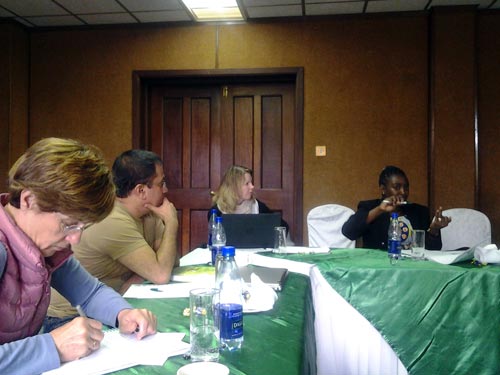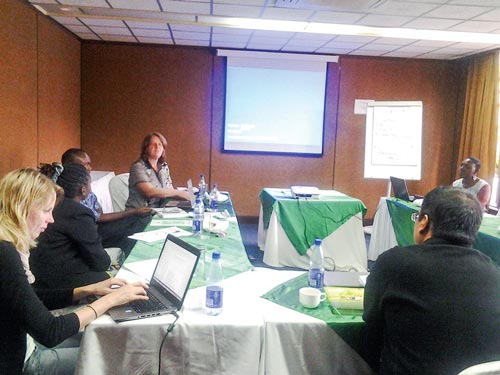By Florence Sipalla /CIMMYT
CIMMYT scientists working on the CGIAR Research Program on Climate Change, Agriculture and Food Security (CCAFS) are exploring novel ways to conduct research on gender and climate change. “Household methodologies offer a potentially innovative entry point for climate-smart interventions,” said CIMMYT-CCAFS project leader Dr. Clare Stirling, explaining the project’s interest in doing in-depth gender research. “In the past, most agricultural interventions have focused on men, even though women provide most of the workforce and day-to-day management and knowledge on farms.”

CIMMYT-CCAFS is keen on tapping into women’s knowledge of farming practices. “Studies show that involving and empowering women in decision-making can have a significant impact on production,” said Stirling. “Evidence suggests that household methodologies can offer a very effective route to increasing the impact of work by CIMMYT-CCAFS.” The CIMMYT-CCAFS team’s commitment to gender research has not gone unnoticed. “At the last CCAFS annual meeting, we won the gender award in recognition of the progress that we have made in our gender activities and outputs,” said Stirling.
The scientists, drawn from multi-disciplinary backgrounds in conservation agriculture, maize and socioeconomics programs, recently held a workshop on gender research methodologies that have been successful in other settings. The workshop was facilitated by gender consultants Cathy Farnworth and Helena Zefanias Lowe, and its purpose was to increase awareness about new approaches. Participants also discussed ways to improve the welfare of women in farming communities by ensuring they are part of the actionable implementation of research at farm level.
One of the methodologies discussed was the Gender Action Learning System (GALS), which allows researchers to use visual tools to gather more nuanced information from farming communities during household studies. “GALS creates opportunities for both men and women. It starts with individuals and grows to collective action,” said Lowe. Sharing examples from Sierra Leone, where GALS was implemented by the International Fund for Agricultural Development, Lowe demonstrated how the method enabled researchers to generate information on how men and women shared resources and decision-making power in the household.

“When we talk about gender, the tendency is to think of it solely as women’s issues, but the GALS method brings other relationships into the picture such as co-wives, older men and younger women,” said Lowe. The use of this methodology resulted in some successes within the community, such as an increased number of women in farmers’ associations and leadership positions, as well as improved negotiation skills for both men and women. Through participation in GALS, some members of the farming community also became trainers and are now able to share their knowledge with others.
Farnworth indicated that the household methodologies discussed at the workshop were not just about women’s empowerment. “The idea is that everybody changes and becomes empowered because men are also disempowered by some of the roles they play,” she said. In discussing household methodologies, Farnworth noted that a great deal of extension work focuses on the household as a unit and does not examine intra-household dynamics, hence the need to consider new methodologies.
CIMMYT socio-economist Dr. Sika Gbegbelegbe gained new knowledge from the workshop. “The method goes beyond the science to bring about transformational change,” she said, adding that learning how GALS had been successful in the West African context was indicative that it could be applied elsewhere. “However, it takes time to implement, to see the change happening in people’s lives,” she added.
 Capacity development
Capacity development